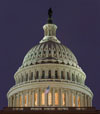
News broke today that the turnout of voters in the southern Sudan referendum has surpassed the 60 percent threshold required for the vote to be deemed credible. It is an important technical milestone, especially in conjunction with the uniformly positive readouts on the first four days of polling from observers. The U.S. for one has a significant presence, between both the Carter Center mission and the deployment of U.S. officials to observe the vote in five out of the 10 states in South Sudan.
The independence vote is “going extremely well” said U.S. Assistant Secretary of State Johnnie Carson in a joint press conference with lead U.S. negotiator Princeton Lyman in Washington, D.C. Tuesday. “[W]e are pleased with the high level of turnout and the cooperation of officials in both north and south Sudan,” Carson said.
“There's been no problems at all throughout the area,” said Ambassador Lyman, who added that the voting environment in the North was well organized, with no overt security problems. (It’s worth pointing out, however, that an atmosphere of intimidation in the North surrounding the referendum led to low turnout during the voter registration process weeks ago.)
But U.S. messaging during this critical phase has rightly not been limited to felicitations. It has also focused attention on the many political obstacles still to overcome – an encouraging sign that U.S. diplomatic engagement will remain at a high level in the coming months.
“Now, a lot of technical work has been done,” said Lyman with regards to the many post-referendum issues northern and southern leaders have to work out. “But the tough political decisions on these issues remains to be done,” he said.
Aside from deciding how to split oil revenues after secession, the two Sudanese governments have yet to decide on what citizenship options will be given to southerners in the North, whether and how debt will be shared, and the status of Abyei (which in recent days saw an outbreak of violence that the U.N. Secretary General said was deeply concerning) among other technical economic and legal issues. Given these realities, U.S. officials have emphasized that this week’s referendum vote is a beginning, not an end.
“[N]o matter what happens, it’s the beginning of a new chapter because issues are going to have to continue to be resolved,” said Senator John Kerry in a press conference in Juba. “We are prepared – in fact, anxious – to be part of helping to write that next chapter.”
And in a hopeful sign of continued U.S. commitment from the very top, this message of “beginning” headlined President Barack Obama’s Sudan op-ed published in The New York Times on the first day of voting.
“[L]asting peace in Sudan will demand far more than a credible referendum,” said Obama, who emphasized the need for a political solution in Darfur in addition to those outstanding issues related to secession. The administration recently appointed former ambassador Dane Smith as the lead U.S. negotiator for Darfur.
U.S. incentives, including removal from the state sponsors of terrorism list, normalization of relations, and ending economic sanctions, remain on the table as a means of influencing the Sudanese government’s decision-making in the way forward. In Tuesday’s press conference, Lyman elaborated on the timing of these incentives, saying that completion of the referendum and acceptance of its results would prompt the U.S. government to begin examining removal of Sudan from the sponsors of terrorism list. Consultations with Congress and other reviews would begin, Lyman said.
Actual removal of the state sponsor designation probably would not take place until July and would require resolution of post-referendum issues and Abyei, according to Lyman.
Photo: U.S. Capitol

